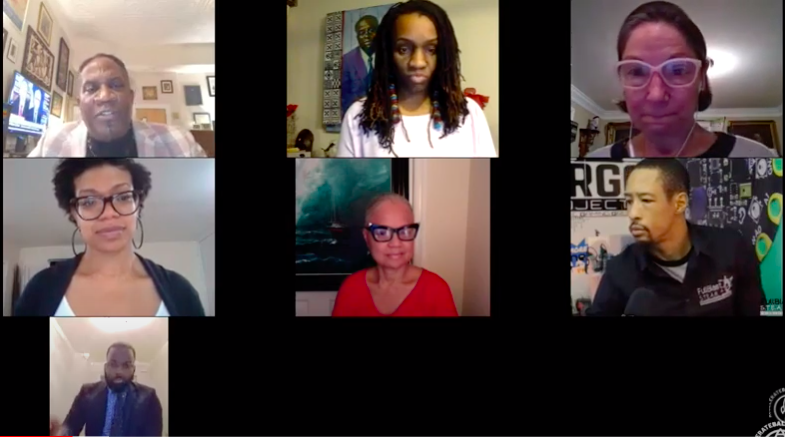Business and civic change can go hand-in-hand. To solve some of the city’s most pressing challenges, they’re probably going to need to.
This ethos was on display as the five entrepreneurs who were part of the 2020 class of ETC’s AccelerateBaltimore accelerator program pitched virtually on Wednesday night.
Led by John Davis through 13 weeks, the program brought a mix of curriculum from both entrepreneurial experts and PitchCreator, mentorship from a collection of local entrepreneurial leaders, and funding of $50,000 courtesy of the Abell Foundation. At demo day, they got a chance to showcase what they’re building.
Here’s a breakdown, with links to videos of each pitch:
Black Brain Trust

The founders: Angel St. Jean and Rob Drayton
The problem: Companies have a role to play in creating equity, but there’s a disconnect. St. Jean explained how, in a former role, company leaders tried to fire her for raising issues about how Black people were being treated by a company during a diversity, equity and inclusion training.
The solution: An equity in action score, which puts data behind a company’s work on equity and creates a clear bar to reach. It’s based on over 100 metrics and feedback.
Quotable: “Equity requires diversity, inclusion and good governance, but those alone have not and cannot create the equitable world that we’re all seeking,” St. Jean said.
Fight Blight Bmore

The founder: Nneka N’namdi
The problem: Baltimore has 80,000 to 90,000 abandoned properties, most of which are concentrated in Black neighborhoods as a result of decades of racist policies. This affects health outcomes, including higher asthma rates, and lower life expectancy. And the data to track info on these properties is disjointed.
The solution: An analytics tool that combines crowdsourced data with municipal and other property data. It’ll be offered as a subscription-based service to answer questions like, which houses should be developed first? Where are concentrations of evictions happening? And who owns the property?
Quotable: Speaking of maps that showed concentrations of COVID-19, Nnamdi said, “it’s no surprise that the most blighted neighborhoods are those most impacted by a virus that literally takes your breath away.”
Full Blast STEAM

The founder: Muhummad Najee-ullah
The problem: There’s a coming shortage of tech workers to fill the multiplying roles that will be open over the next decade. “If we see our young ppl as trainable viable candidate, then the question is how do we get our young people to be that talent?” Najee-ullah said.
The solution: Provide an onramp to STEAM activities with academies and pop-up events that offer exposure to technology like robotics, drones, 3D printing, and augmented and virtual reality. Plus, 21st century skills like communication, creativity and critical thinking.
Quotable: “I’ve witnessed fun turn to felonies quick when kids don’t have consistent activities to fall in love with,” said Najee-ullah, who is from Baltimore.
Sankofa Community Network

The founders: Nancy Goldring and Omari Bakari
The problem: Many Baltimore communities are disconnected from the internet, and that includes public and senior housing. Residents of these communities also have health challenges.
The solution: Starting with McCulloh Homes, Sankofa aims to create a public Wi-Fi network, using small cell technology. This will allow connectivity in a community where 31% of residents have no internet access and 35% have only a mobile device. It will also enable Sankofa’s remote patient monitoring kiosk, and telehealth app marketplace that can help to get care to residents.
Quotable: “The reason we’re building the Wi-Fi network is so we can provide remote patient monitoring to this group of people who otherwise can’t get to the doctor,” Bakari said. “This will be the only way they have to maintain quality of life.”
Supir

The founder: Patrick Parents
The problem: Transit agencies and other employers of commercial drivers have high turnover because many drivers are overworked and have rigid schedules due to understaffing.
The solution: An on-demand platform that connects drivers with companies. This allows companies to staff up as they need, while enabling flexible schedules for drivers.
Quotable: “For the last 10 years I’ve been a bus driver for one of the nation’s largest transit agencies,” Parents said, “and during those 10 years I’ve probably missed seven Christmases.”







